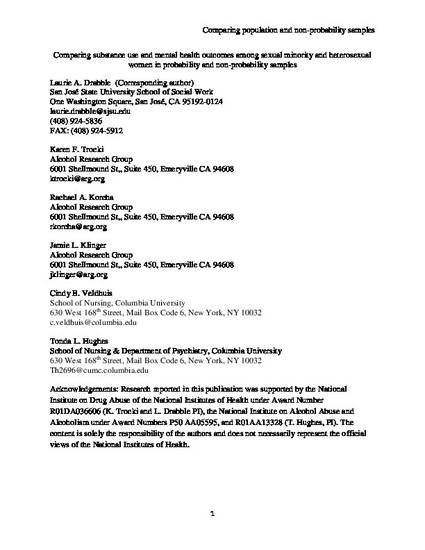
Article
Comparing substance use and mental health outcomes among sexual minority and heterosexual women in probability and non-probability samples
Drug and Alcohol Dependence
(2018)
Abstract
Objective
To examine similarities and differences in demographics and key substance use and mental health outcomes in a probability sample of heterosexual women and two samples of sexual minority women (SMW), one recruited using probability and the other using non-probability methods.
Methods
Using data from four waves of the National Alcohol Survey (NAS; n = 315 SMW; 10,523 heterosexual women) and Wave 3 of the Chicago Health and Life Experiences of Women (CHLEW; n = 688 SMW) study, we examined hazardous drinking, drug use, tobacco use, depression, and help-seeking for alcohol or other drug problems.
Results
Compared to SMW in the probability sample, SMW in the non-probability sample were older, more likely to be college educated, and more likely to be in a partnered relationship. Compared to heterosexuals, SMW in both the probability and non-probability samples had greater odds of past-year hazardous drinking, marijuana use, and other drug use. We found similar results for lifetime help-seeking for alcohol or drug problems, past week depression, and co-occurring hazardous drinking and depression. In comparisons with heterosexual women, the magnitude of difference for drug use was greater for the SMW non-probability sample; for tobacco use, the difference was greater for the SMW probability sample.
Conclusion
Given the difficulties recruiting probability samples of SMW, researchers will continue to use non-probability samples in the foreseeable future. Thus, understanding how findings may differ between probability and non-probability samples is critically important in advancing research on sexual-orientation-related health disparities.
Keywords
- Sexual minority women,
- Hazardous drinking,
- Drug use,
- Tobacco,
- Depression,
- Non-probability and probability samples
Disciplines
Publication Date
April 1, 2018
DOI
10.1016/j.drugalcdep.2017.12.036
Publisher Statement
© 2018. This is the Accepted Manuscript version and is made available under the CC-BY-NC-ND 4.0 license http://creativecommons.org/licenses/by-nc-nd/4.0/
The Version of Record is available at this link: https://doi.org/10.1016/j.drugalcdep.2017.12.036
SJSU users: use the following link to login and access the article via SJSU databases.
Citation Information
Laurie A. Drabble, Karen F. Trocki, Rachael A. Korcha, Jamie L. Klinger, et al.. "Comparing substance use and mental health outcomes among sexual minority and heterosexual women in probability and non-probability samples" Drug and Alcohol Dependence Vol. 185 (2018) p. 285 - 292 ISSN: 0376-8716 Available at: http://works.bepress.com/laurie_drabble/96/
Creative Commons license

This work is licensed under a Creative Commons CC_BY-NC-ND International License.
